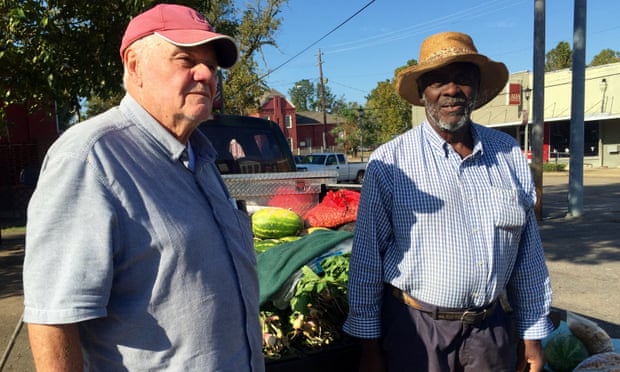
A series of recent government maneuvers in Alabama may prevent some citizens from voting across large swathes of the state, particularly in poverty-stricken Black Belt counties.
The first of the moves happened a year ago, when Alabama enacted a law requiring voters to present government-issued identification at the polls. The second happened two weeks ago, when the state shut down dozens of driver’s license-issuing offices, leaving 28 counties with no means of issuing the most common form of ID.
The Republican governor, Robert Bentley, says the office closures are a cost-cutting measure. Opponents say they are an effort toward disenfranchisement that harkens back to Alabama’s painful past. A half-century ago, Bloody Sunday in Selma led to the Voting Rights Act, removing obstacles for black voters.
While politicians and activists squabble in the state capital, many residents in isolated, rural areas have not yet heard of the changes or grasped their impact.
In Hale County, Sandra Smith works as the clerk at a state department of transportation office. On Friday, she did not know that the county no longer issued driver’s licenses.
“Well, I don’t like that,” she said. Then her face brightened. “I live in Perry County, so I should be OK.”
Not so – Perry County has also lost its license offices.
She gestured toward a photo of the governor hanging on the wall.
“Last I heard Mr Bentley was working to stop this?” she said. “I don’t know what people are going to do.”
Wilcox County is the poorest county in Alabama, and one of the poorest in the nation. Outside the courthouse in the county seat of Camden, Willie Moton sat on a corner selling vegetables and melons. He is 72, and most days he spends about 10 hours on the corner. On a good day, he said, he sells $30 in produce.
On Friday he tallied up his sales in a tattered notebook, and grinned. “This is a great day,” he said. He had made $33.
When told the state had closed Wilcox County’s driver’s license offices, his face fell.
“Oh, no. I hate to hear that,” he said. “My license has expired.”
The nearest license office, now, is in Selma, about 45 minutes away.
Wilcox County’s circuit clerk, Ralph Ervin, said Moton was lucky – he can get his license renewed at the probate court in Camden. He could also acquire a voter identification card at the county registrar’s office. The problem is Moton, and many others like him, don’t know how to navigate the various bureaucracies. Across the state a half million voters – one in five – don’t have a photo ID.
And even when they do, Ervin said, people who live beyond walking distance will struggle to get there. Working cars are so rare in Wilcox County, he said, that a native ride-sharing barter economy has grown up. When Ervin needs to gather a jury of 12 county residents for a trial, he said, he regularly sends out more than 200 subpoenas, because so many candidates will be stricken from jury duty because they have no transportation.
“I know it’s hard for people outside to understand,” he said. “This is what poverty means.”
The idea of people here finding ways to and from farther towns, he said, is nearly impossible: “The state is cutting from those who have the least.”
Ervin’s forebears were slaves on the Ervin plantation in Wilcox County. On Friday, as he worked out the implications of the two-step change – requiring ID to vote, and then shutting down the most common ID provider – his voice rose.
“Black people made it past the poll tax, literacy tests, everything, to get the right to vote. Driving is a privilege, but voting is a right,” he said. “Too many people fought and bled and died for the right to vote, and now they’re taking it away.” Here he arrived at an accusation that is starting now to rumble across other counties: “It’s deliberate. It’s done by design.” It’s a way, he said, of consolidating power in the wealthier – and whiter – centers of Birmingham, Huntsville and Mobile.
Bentley argues otherwise. Where the state’s critics see purpose, he said, there is only coincidence.
Both sides could be right.
In the Alabama’s early history, its agricultural heart became known as the Black Belt because of its dark, rich soil. Now it’s often called that because of the color of its residents’ skin. That was never the intended meaning of the term – but in reality slaves were concentrated in those counties directly because of that same soil.
Likewise, Alabama’s officials may not now conspire to isolate the state’s black citizens – but they make up the vast majority in the affected, impoverished counties.
Outside the Wilcox County courthouse in Camden, Willie Moton’s friend Breston Hughes sat next to him. The two waited together for customers to stop for tomatoes or sweet potatoes.
“These politicians all talk about their Christianity, but what would Jesus say to them?” Hughes said. “When they talk about cutting waste, the waste they’re talking about is poor people. We are the waste.”
Hughes is 76; he said he lives on a monthly social security income of about $1,200.
Moton smiled. “Man, I wish I got that much,” he said.
His monthly social security check, he said, was $700. So he’ll just keep hauling watermelons and sacks of peanuts, he said, until his back gives out.

No comments:
Post a Comment